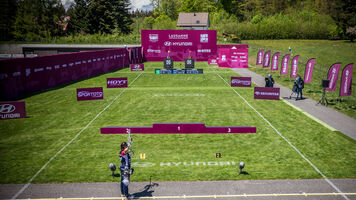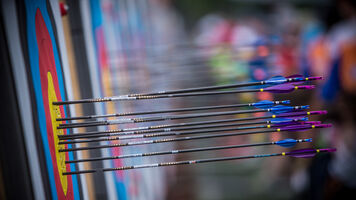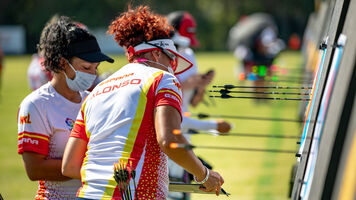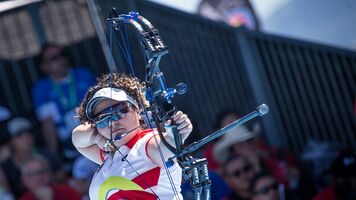Germany’s Elena Richter opens up about unexpected retirement

She surprised everyone but herself.
Elena Richter always knew she was going to retire in 2020. The German recurve archer wanted to call it quits after 2016, if she’s being honest, but she figured she’d stick around for one more Olympic Games, extending her farewell tour with a pit stop in Tokyo before beginning the next chapter of her life.
Alongside defending Olympic silver medalist Lisa Unruh and world-number-five Michelle Kroppen, Richter was a pivotal member of the trio that qualified Germany’s first full team quota to the Games since 2004.
If last year’s Hyundai World Archery Championships were any indication, the summer of 2020 would be one to remember.
The spread of the ongoing COVID-19 pandemic threatened to derail those plans. Events major and minor have been cancelled, moved or postponed in the wake of the virus, with the Tokyo 2020 Olympic Games serving as one of the biggest concerns for athletes whose lives revolve around four-year training cycles.
But Richter’s plans remain unchanged.
When faced with the choice of enduring another year of intensive training or staying the course with her retirement, the 31-year-old decided to proceed with her original edict and put an end to her competitive archery career.

“It’s all too unsure for me,” Richter said. “I don’t have the motivation anymore. Even if there is going to be an Olympic Games next year, I don’t see how it will happen in a way that we’re used to.”
Richter began weighing her options long before announcing her retirement last month. In April, at the advisement of her sports psychologist, she began compiling a ‘Book of Success’ of her best memories as a way of processing a decorated career that has spanned two decades.
The project involved a lot of printed photos and extensive reminiscing. In the past, Richter said, she has struggled to embrace her accomplishments – instead, focusing on her shortcomings and imperfections.
Any victory was incidental, the result of luck and never fully earned. Rather than embracing her talent, she was fueled by doubt and insecurity.
Richter won the women’s recurve title at the World Indoor Archery Championships in 2018 (the last that will be held after it was officially removed from the international calendar in 2019) and she is the only German woman to claim individual gold at a stage of the Hyundai Archery World Cup, having done so in Shanghai in 2014.
And yet, for all of her success, she never felt quite complete.
“I was never able to say I won because I was good,” Richter said. “I was never sure of my capabilities or my strength. Even when I could have taken credit for something, I was never able to really see it.”
The act of reminiscing granted her permission to celebrate her successes and make visible all she has achieved.
“I’m proud, and I would say I’m even more proud and even more willing to say that I’m proud now that I’ve retired, which is kind of ridiculous,” Richter said. “You need to cherish these moments. But that’s not something active sportspeople do: celebrate their achievements.”
Richter’s impact, however, was never lost on her teammates. Her unexpected decision leaves Germany in a tough position.
In international competitions, Germany has rotated its fourth archer on the Hyundai Archery World Cup circuit in recent seasons. But nobody stands out as an obvious and ready-made replacement for Elena in the squad.
“I was shocked,” Kroppen said of Richter’s announcement. “I don’t know who will replace her, but there is no athlete who has all the experience Elena has. That’s what makes her so special.”
Still, Richter appears to have left the team on good terms. Before issuing her press release in August, Richter alerted German coach Oliver Haidn through a written letter that she would not continue competing.
The team held a farewell barbeque at its national training centre in Kienbaum, and Haidn drove to Berlin, where he and Richter had a long conversation before finding closure.

“I do understand her decision,” Haidn said. “The plan before corona was different for all of us. But we have to adapt.”
In the meantime, Olympians are grappling with the emotional fallout of another year of training that in many ways matches the practical challenges of dealing with the pandemic.
It’s an unprecedented challenge. Athletes are training – often in facilities less orientated towards high-performance archery than what they are accustomed to – even though it is unclear whether normal competition will resume.
“I don’t talk to my teammates about it, because I know they are still preparing for the Olympics and dreaming of it, and I don’t want to tell them, ‘Well, don’t you know that it’s unrealistic to assume it’s going to happen?’” Richter said.
“I know people don’t want to say that, and I know people don’t want to hear it because they want to hear positive news, positive things. But you have to be realistic.”
Richter paused.
“People don’t need to read about it or talk about it if they don’t want to,” she said. “But it’s hard to ignore.”
Scepticism directed her way is bound to arise in equal measure. Richter represented Germany at the London Olympics in 2012, and she became the European recurve champion in 2011. She is part of arguably the strong recurve women’s squad in history.

And, according to the International Olympic Committee and Tokyo 2020, preparations for the Games are proceeding well.
They’ve recently agreed on a set of measures to save costs, make hosting the Olympics more efficient and safeguard participant well-being in the reality of a post-pandemic world. Despite Elena’s opinion, the signs point towards a delayed Games – although perhaps a unique edition – happening in July 2021.
So from an outside perspective, it’s only natural to wonder why someone who is still widely acknowledged as an elite archer, who is poised for both individual and team success at the Olympics, would want to walk away from her profession.
Yet she does not expect to be seduced by the Olympics in the future. Retiring is a conscious change. The impulse to quit took root, and she sought to make the decision binding.
“That’s my biggest fear: to regret it,” she said, anticipating the question. “But it’s time to move on. I don’t need it anymore.”
She is not going to stay idle. Richter got married in July, and she recently bought a house as well. With archery behind her, she is ready to resume her education and pursue a degree in psychology.
Archery has given Richter so much. Now she wants to explore the world in a different way.
“It might sound like something has died, but it’s not like that,” Richter said. “I don’t think it’s sad at all. In fact, it’s quite exciting. It’s a new beginning.”












